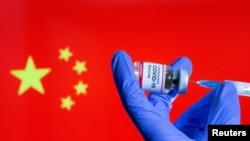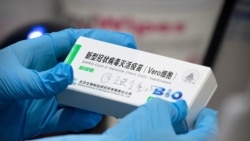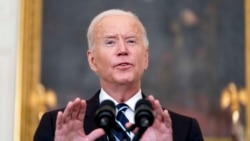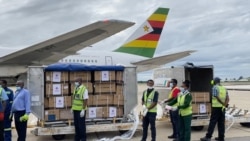Despite doubts about the effectiveness of China’s COVID-19 vaccines, the global vaccine shortage is giving China an international soft power boost.
China’s Ministry of Foreign Affairs announced this week via the official Xinhua News Agency that it had delivered 1.1 billion vaccine doses to more than 100 countries during the pandemic.
This component of Chinese soft power, a tool used to deepen friendships abroad and vie for recognition over its archrival, the United States, despite festering disputes, could help boost China’s image in vaccine-recipient countries that cannot easily source doses from other places, observers said.
“They work, maybe, less effectively and efficiently and timely than the vaccines that are produced in the Western countries but nonetheless they offer a certain level of immunization that’s always better than no immunization at all,” said Fabrizio Bozzato, senior research fellow at the Tokyo-based Sasakawa Peace Foundation’s Ocean Policy Research Institute.
“It appears that China’s vaccine diplomacy is working very well, to the detriment of the West, given the impression that it’s keeping the best weapons against COVID-19 to themselves,” Bozzato said. China will enjoy an image as a “reliable partner that’s willing to help,” he said.
Limited effectiveness, widespread availability
Of the vaccines developed in China, the World Health Organization calls Sinovac doses 51% effective against symptomatic infections and Sinopharm vaccine 79% effective. Specific data points, especially on the effectiveness against the delta variant, are few, said John Swartzberg, a clinical professor emeritus at the University of California-Berkeley's School of Public Health. However, Chinese formulas work better than no vaccine, he said.
Within the year, China plans to offer a cumulative 2 billion vaccine doses abroad “and this can totally be done,” Xinhua says. Southeast Asia alone has received 360 million doses to date, it adds.
Xinhua says China has established vaccine plants in 15 countries, a boon to low-cost distribution. Sinovac was one of the world’s first pharmaceutical firms to develop a mass-market vaccine last year.
The United States is accelerating plans to distribute more vaccines. In June, the U.S. purchased 500 million doses to be distributed by COVAX, the WHO-backed initiative for low and middle-income countries. As of August, the U.S. government had donated 110 million doses overseas.
But that has done little to satisfy critics such as New York-based advocacy group Amnesty international, who say Western countries are “hoarding” vaccines for their own populations.
In a June statement, the group criticized the bilateral purchase agreements between wealthy countries and pharmaceutical companies, saying “instead of facing up to their international obligations by waiving intellectual property rules for vaccines, tests and treatments, and sharing lifesaving technology, G-7 leaders have opted for more of the same paltry half-measures.”
Media reports say President Joe Biden is expected to announce plans next week at the U.N. General Assembly for countries to pledge resources to vaccinate 70% of the world by September 2022. According to the World Health Organization, that will require about 11 billion doses.
And that effort could still run into supply bottlenecks.
Pfizer, a top name in the United States, points to obstacles offshore in vaccine packing, distribution and cold storage, but company CEO Albert Bourla said in an open letter that Pfizer is “continuing to work around the clock so we can bring the vaccine to the world as quickly, efficiently and equitably as possible.”
Many people in poorer parts of the world where COVID-19 cases continue to multiply are getting the Chinese shots with few side effects and a sense that any breakthrough infections would be mild, according to analysts and people from affected countries.
“History’s not going to look very kindly on China’s reluctance to be more forthcoming with their data, but history may be pretty kind to China if China just produces a lot of this vaccine and makes it available worldwide,” Swartzberg said.
Some Indonesians can choose only between a Chinese vaccine or none, said Paramitaningrum, an international relations lecturer at Bina Nusantara University in Jakarta. She and her aging parents got the Chinese vaccines earlier in the year.
China’s image isn’t getting worse, Paramitaningrum said. “That kind of anti-Chinese sentiment is still there, but I could say it has low percentage – only for some particular reasons – but in general they are OK,” she said.
Vaccines not expected to cure old disputes
In some countries, China’s vaccine diplomacy is not enough to erase pre-existing disputes.
Indonesians and Filipinos resent Chinese expansion in the 3.5 million-square-kilometer South China Sea where maritime sovereignty claims overlap. China, backed by Asia’s strongest military, has built artificial islands on shoals and reefs that Manila claims. Chinese ships also sail through waters that Jakarta says fall within its exclusive economic zone.
Other countries are embroiled in trade and investment flaps with China while people in much of the world bristle toward China as the coronavirus’s source.
The widespread availability of low-cost or donated Chinese medical aid won’t neutralize those issues but could temper any new flare-ups, analysts believe.
Most vaccines introduced in Brazil earlier this year came from Sinovac, and Brazilian researchers said in December after a clinical trial that the vaccine was more than 50% effective.
Still, Brazilian President Jair Bolsonaro said May 5 that the pandemic could be "chemical warfare" waged by a fast-growing nation widely presumed to mean China.
But heads of state in the Philippines and Vietnam, another normally outspoken South China Sea claimant, have not engaged in anti-China comments.
Common Filipinos take a pragmatic through guarded view. Many prefer non-Chinese vaccines but cannot tell clinics which brand to administer, domestic news website Inquirer.net reports.
“The president, the executive of the country, it’s his decision to bring in Sinovac, but on the ground the people, that’s really their last choice,” said Marivic Arcega, operator of an animal feed distributor in the Manila suburb of Cavite. She got an AstraZeneca shot while her husband got Sinovac.
In Vietnam, which began accepting Chinese vaccines in June, a lot of people are refusing the shots despite their country’s first major COVID-19 outbreak that began in June, said Jack Nguyen, partner at the business advisory firm Mazars in Ho Chi Minh City.







